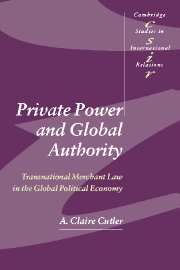Book contents
- Frontmatter
- Contents
- Acknowledgments
- Acronyms and abbreviations
- 1 Introduction
- 2 Conceptualizing the role of law in the global political economy
- 3 Theorizing the role of law in the global political economy
- 4 Medieval lex mercatoria
- 5 State-building: constituting the public sphere and disembedding the private sphere
- 6 The modern law merchant and the mercatocracy
- 7 Conclusion: Transnational merchant law and global authority: a crisis of legitimacy
- References
- Cases cited
- International treaties and United Nations documents
- Index
- CAMBRIDGE STUDIES IN INTERNATIONAL RELATIONS
2 - Conceptualizing the role of law in the global political economy
Published online by Cambridge University Press: 01 March 2010
- Frontmatter
- Contents
- Acknowledgments
- Acronyms and abbreviations
- 1 Introduction
- 2 Conceptualizing the role of law in the global political economy
- 3 Theorizing the role of law in the global political economy
- 4 Medieval lex mercatoria
- 5 State-building: constituting the public sphere and disembedding the private sphere
- 6 The modern law merchant and the mercatocracy
- 7 Conclusion: Transnational merchant law and global authority: a crisis of legitimacy
- References
- Cases cited
- International treaties and United Nations documents
- Index
- CAMBRIDGE STUDIES IN INTERNATIONAL RELATIONS
Summary
This chapter establishes the analytical foundations for examining the changing nature of authority and law in the regulation of international commerce. It begins by noting the ubiquity of law today regulating local, national, international, and transnational commercial transactions and identifies significant trends in governance that are linked to deeper transformations in the global political economy. The law merchant (lex mercatoria), or private international trade law, is argued to play a crucial role in the increasing juridification, pluralization, and privatization of commercial law and practices. However, this role is obscure and little understood by students of international relations for a number of reasons. The centrality of the law merchant to the historical and contemporary constitution of the global political economy is obscured by analytical, theoretical, and normative or ideological orientations in the dominant approaches to the study of international law and international relations. Analytically, the complexity of the way in which the rules of private international trade law operate, the contested nature of the relationship between public and private international trade law, and the location of the law merchant within this legal framework contribute to a lack of understanding of its significance. This problem is compounded by theories of law, politics, and economics that maintain a set of rigid conceptual distinctions, including the distinctions between private and public law, economics and politics, and civil society and the state.
- Type
- Chapter
- Information
- Private Power and Global AuthorityTransnational Merchant Law in the Global Political Economy, pp. 16 - 59Publisher: Cambridge University PressPrint publication year: 2003

